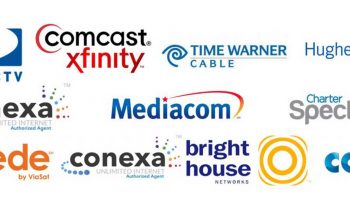The Fastest Internet Providers

Nowadays everything seems to revolve around the internet—work, entertainment, and even social connections rely on some sort of internet connection. Years ago reliability and enough bandwidth to browse adequately was enough. However, these days data lines once though only necessary for business is not barely enough for entertainment. So, it’s no wonder the big question is “Who is the fastest internet provider in my area?” This is a straightforward question that’s not always easy to answer.
Internet speeds differ based on where you live. Plus, your speed requirements are also affected by how you use the internet. But if you’re like us and you use the internet for just about everything, then these are the top providers to consider.
Compare the Fastest Internet Service Providers
The rates on each varies by area, and availability is based on technology near your home or office. However, if you don’t think you’ll ever need speeds over 100 Mbps consider this – do you watch movies online? On a typical 8 Mbps cable connection it would take about 1 hour 15 minutes to download an HD movie. With a connection over 300 Mbps it would take less than one minute. Like downloading music? That can be even worse over a slow line since you’re downloading so many songs.
The fastest internet in your area
Once you determine what Internet speed you’d like to have, the next step is to click through the links to find out if they’re available in your area. Even if an ISP operates in your state, the only way to know for sure if you can get service is to check your ZIP code on the ISP’s website. Once that’s done ordering online is simple and easy – or call to schedule an installation. But, there are times when the ISP you want is not in your neighborhood so it’s best to check more than one.
The internet speeds you need
If you’re not sure what internet speed you want (or need), you can use the recommended minimum download speeds from the FCC.
- Casual web browsing: 1 Mbps
- Streaming video: 4 Mbps
- Video conferencing: 4 Mbps
- Online gaming: 5 Mbps
- HD Streaming Videos: 25 Mbps
Keep in mind these numbers apply to individual users. For example, if you’re a household of two and you both want to watch streaming video (Netflix, YouTube, Hulu, etc.), you’ll want to double the recommended speed so you can watch your shows and movies simultaneously without interruption. Also, the recommendations above are for those just watching movies or listening to music – not saving it on your computer.
What to know about fast internet
Which ISPs are fast, affordable, and available?
Out of our top pics for fastest ISPs, Frontier is the best bang for the buck. Its basic plan is offered for $30 a month with no annual contract. It also offers service up to 500 Mbps speeds which are much lower than competing high speed service. However, Frontier is not widely available.
The most widely available ISP that’s still fast and affordable is XFINITY. It’s available in 40 states, whereas Optimum is only available in four. XFINITY is also fast—the 80/80 download speed is 100%—and it’s just as or more affordable than other ISPs. XFINITY’s basic plan, Performance Starter, starts at $29.99 a month—the same as Charter’s basic plan and $5 less per month than Time Warner Cable’s basic plan.
AT&T is still a good choice for those on budget, but their lowest rates are for DSL. Also, if you want a DSL line it’s best to call since they don’t advertise it widely.
Fastest ISPs for remote or rural areas
If you can get DSL service, we recommend it over satellite internet because it typically has higher data caps and faster speeds. However, if it’s a choice between dial-up and satellite, satellite internet usually beats dial up for speed and available options.
The fastest type of internet connection
The fastest ISPs use either fiber or cable. Fiber is the fastest way to access the Internet, but it’s also the most expensive. Fiber converts electrical signals to light which travels through tiny glass filaments. Therefore, transmission speeds vary greatly depending on several factors. Cable is a close second, but typically has less variance so is still tough to beat. For a business top speeds at the lowest possible price may not be the best option. T1 line reliability may be the fastest overall.
A stand alone T1 line provides 1.5 Mbps of bandwidth, which is slow by today’s standards. However, by combining or bonding multiple T1 lines, it is possible to reach speeds of 12 Mbps. T1’s are expensive – typically ranging from $250.00/mo to upwards of $900.00/mo or more. This makes T1’s one of the most expensive connections when breaking it down “Per Meg”. Although they have a smaller internet “pipe” and are more expensive then consumer level connections such as FiOS, DSL and Cable, they are truly business class connections that will deliver consistent up-time and reliability. So, although a standard consumer Cable connection may be faster than a T1 it has to share bandwidth with other consumers in the area. And, if it has problems it could take hours for repair – since it’s not a priority for the ISP. For businesses that depend on the Internet, T1’s should strongly be considered over the cost savings of consumer level connections.
DSL internet has the potential to be just as fast as cable, but the FCC noted a growing disparity between the two internet types for reasons such as the need to update DSL infrastructure and a lack of investment in the technology. Whatever the reasons may be, DSL just isn’t performing as well as fiber or cable, and the FCC noticed no significant speed-enhancing improvements in DSL technology over the past five years.
For gamers, folks who download videos and music, and work at home professionals these higher speed internet connections may be important to consider. And, as rates drop don’t shy away from giving them a try. Click through each for a free quote – you have nothing to lose.




